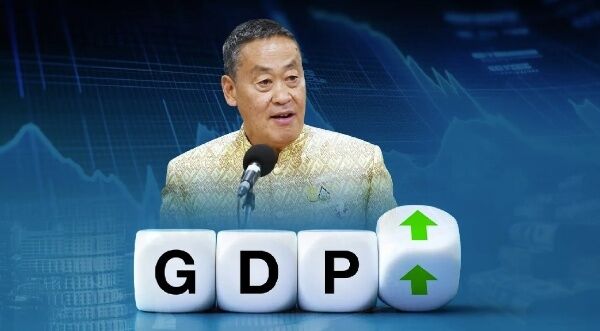Making cents: Thai PM showers BoT governor with praise

During the Council of Economic Ministers’ meeting yesterday, Prime Minister Srettha Thavisin showered praise on Central Bank Governor Sethaput Suthiwartnarueput for his constructive opinions on economic measures.
This commendation comes hot on the heels of criticism from the PM’s adviser, Pichai Naripathaphan, who had lambasted the central bank for its inaction in supporting the government’s efforts to spur economic growth.
Speaking yesterday, PM Srettha revealed that Governor Sethaput had accepted the invitation to join the meeting and had offered valuable insights. However, the prime minister did not provide specific details about the suggestions made.
When questioned about the future relationship between the government and the Bank of Thailand (BoT), the Thai premier expressed optimism.
“I believe everybody has good intentions for the country, but we need to discuss methods for helping the people and reviving the economy.”
The backdrop to this meeting is the central bank’s consistent refusal to accede to the government’s calls to lower the policy interest rate from 2.5% by at least 25 basis points. Moreover, the BoT opposed the government’s digital wallet scheme, which proposes distributing 10,000 baht to approximately 50 million eligible citizens.
Avoiding a direct answer on whether Governor Sethaput had softened his stance on the digital wallet initiative, the Bangkok-born PM said he believed everyone was pulling in the same direction.
“I believe all who attended the meeting, including the BOT governor and the secretary-general of the Office of the National Economic and Social Development Council, had the same goal, improving the Thai economy. The digital wallet scheme was among several projects we discussed, and all listened and shared their opinions.”
The prime minister also exuded confidence that Thailand would achieve its projected GDP growth of 2.5% this year, reported The Nation.
He emphasised the government’s commitment to accelerating budget disbursement to stimulate the economy, underscoring a collaborative approach to driving economic recovery.
ORIGINAL STORY: Thailand PM calls urgent meeting with economy ministers
Thailand Prime Minister Srettha Thavisin called for an urgent meeting with economy ministers to discuss short-term economic stimulus measures to address Thailand’s sluggish economic performance in the first quarter of 2024.
The National Economic and Social Development Council (NESDC) reported that Thailand’s economy grew by only 1.5% year-on-year for the first three months of 2024. This lacklustre growth has prompted the government to consider immediate measures to support small- and medium-sized enterprises (SMEs) and households at risk of defaulting on their debts, according to government spokesman Chai Wacharonke.
The government recognises the necessity of implementing these short-term measures swiftly, although more long-term strategies will be introduced in the future, said Chai.
A source revealed that the Thai premier met with Deputy Prime Minister and Finance Minister Pichai Chunhavajira, the governor of the Bank of Thailand, and the secretary-general of the NESDC to prepare for today’s meeting.
Chai noted that the 62 year old prime minister was particularly disappointed by the 1.5% growth rate, especially considering the government’s efforts to boost the tourism sector. As a result, ministries and state agencies have been tasked with developing new strategies to stimulate economic activity in the short term.
The NESDC’s report last week highlighted that Thailand’s economy grew by 1.5% in Q1 of 2024, with an expected annual growth rate of 2-3%, down from the previous forecast of 2.2-3.2%. Last year, the economy grew by an average of 1.9%.
Slow growth delays
Prime Minister Srettha attributed the slow growth to repeated delays in the 2024 budget deliberation and distribution, which led to deficits impacting the economy negatively, according to the spokesman.
Finance Minister Pichai stated that the 1.5% growth in Q1 does not reflect Thailand’s actual economic capacity. He emphasised the need for more effective short-term stimuli to boost growth, noting that the figure is lower than those reported by neighbouring countries.
Deputy Prime Minister and Commerce Minister Phumtham Wechayachai tasked the permanent secretary for commerce with gathering data for today’s discussions, which will focus on the reasons behind Thailand’s slow Q1 growth. He mentioned that the measures would aim to boost exports and help people cope with the rising cost of living.
Deputy Finance Minister Julapun Amornvivat acknowledged that Thailand’s 1.5% growth rate in Q1 was the lowest in ASEAN but noted that it exceeded government expectations. He attributed the slow growth to weak export and industrial sectors but highlighted the strong performance in tourism and services as a positive factor.
Julapun expressed optimism that growth would improve later in the year but admitted that significant growth might not occur until the third quarter, given that the 2024 budget was only recently passed.
The Bangkok-born prime minister’s meeting is seen as a response to the realisation that the 500-billion-baht digital handout scheme cannot be relied upon to drive immediate economic growth, according to a source.
“We have to do something now… without the outstanding economic performance of the tourism and service sectors, we would have encountered an economic recession.”
One proposal on the table is to create a war room to monitor the economic situation. The NESDC has urged the government to expedite the disbursement of the 2024 budget, accelerate expenditure planning for the next fiscal year, and assist SMEs by improving access to funding sources, reported Bangkok Post.
Latest Thailand News
Follow The Thaiger on Google News:


























